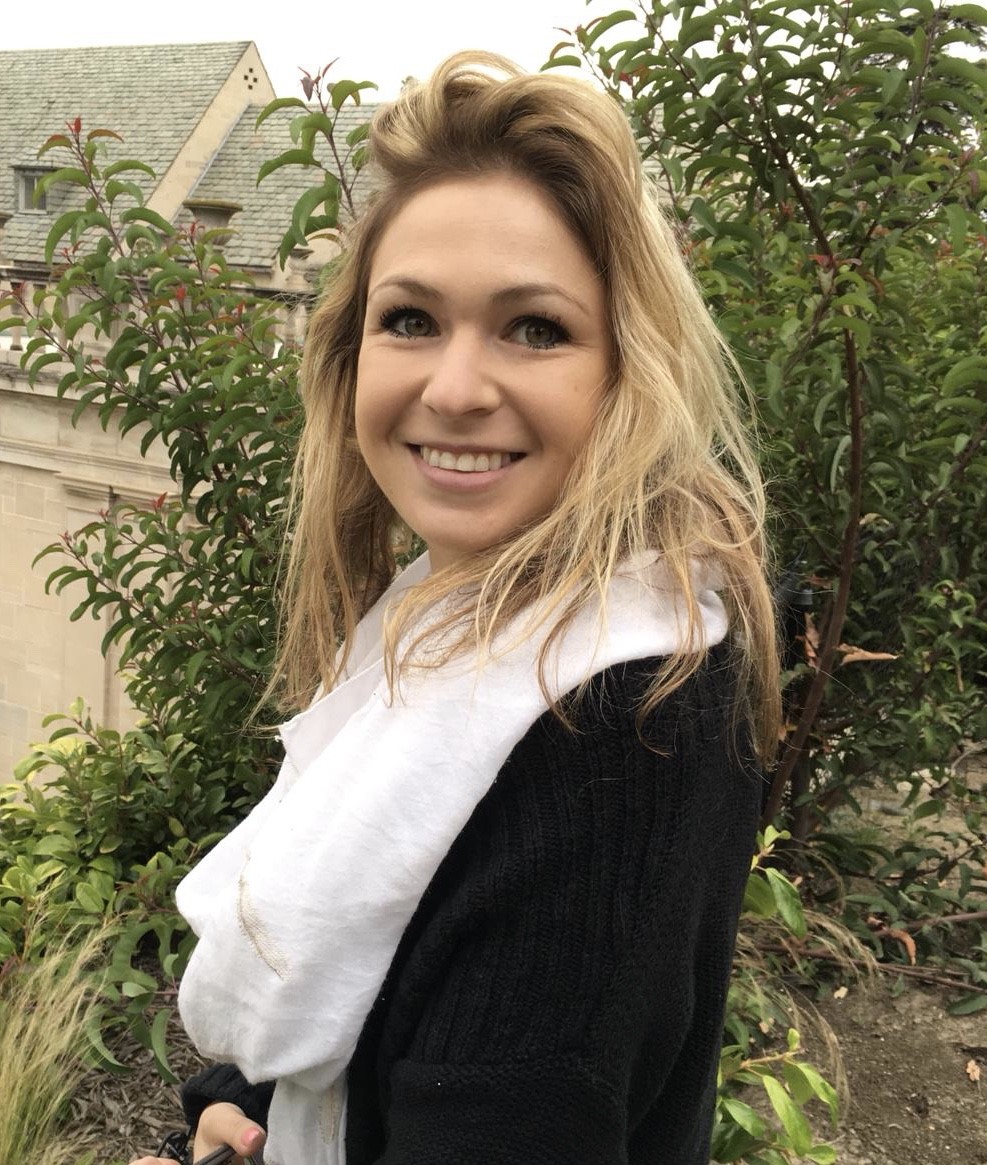 By MIRIAM ACZEL
By MIRIAM ACZEL
Co-Active Coach Dr. Beth Offenbacker is the Director of Training and Development for Leaders in Energy, and runs the widely successful annual Green Career Momentum Coaching Program. With this year’s Green Career Momentum about to kick off in a week, we thought it was the perfect opportunity to catch up with Dr. Offenbacker and learn a bit more about her own career path.
Miriam Aczel: Tell us a bit about your career trajectory. What first drew you to the field of sustainability?
Beth Offenbacker: My first exposure to working in sustainability was when I worked as a Senior Writer and Speakers Bureau Coordinator at Potomac Electric Power Company a few years out of college. My job involved educating people about how power is generated and many related energy and environmental issues. That was my first sense that this field existed.
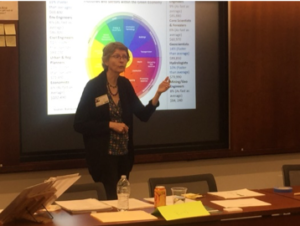
MA: How did you first establish Waterford, Inc.?
BO: In the 1990s I began doing consulting. I had a senior executive woman as a mentor and she very much believed in me. She was an experienced entrepreneur and one day during one of our discussions, she said, “You know, you can do consulting on your own.” I’ll never forget that. She’s a large part of why I started my own company, and I’m forever grateful for her seeing in me something I didn’t see myself and encouraging me to step forward.
After working on many kinds of consulting projects for the first few years, I felt very drawn to land use issues, which of course are environmental issues. I was fortunate to work with several organizations who wanted to do the right thing and needed an expert who could engage the public in doing that. A good part of that work involved educating people and facilitation.
My work as a college instructor had been progressing on a parallel track. After researching community engagement and policymaking and teaching both topics, often to environmental professionals, I realized how much I enjoyed working with people in the sustainability field to develop their skills.
And then I met Janine Finnell [Executive Director of LE]. It was quite serendipitous because it brought my consulting, facilitation, training and coaching work together, and she and I have become great colleagues and friends as a result.
MA: What motivated you to begin coaching others?
BO: This was a real progression for me. I started out teaching, then moved to facilitating public meetings, followed by developing and leading training workshops — and then I began to delve even more into coaching.
As a professor, you’re always coaching and mentoring students — really doing the same thing for them that my mentor many years ago did for me. “You have what it takes and you can do this. And I’ll help you get there.”
Coaching also involves guiding a person in clarifying their goals, a plan to implement it, and supporting them in doing just that. It’s about being a “Guide on the Side” for what they want to do.
MA: How does your research and work in public participation shape your pedagogical methods?
BO: It’s a core foundation of everything I do. The problems we have today in our world are all people-created challenges. We need to know how to effectively engage people in solving those problems, in ways that accept and respect them and what they can contribute to addressing those issues.
My research also is international in scope, and I am always learning new things about what engagement “looks like” in different places, cultures, and communities, and how we can do it better. I constantly draw on what I learn in how I engage with people and organizations in my work.
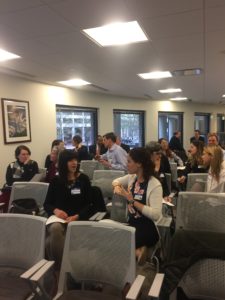
MA: How did you first develop the Green Career Momentum?
BO: Green Career Momentum was a natural next step after the Green Career Workshops we’ve been offering from LE for the last few years. One of the themes we started to hear from people was that they wanted to take the career management work we do in the workshops to the next level — to provide a dedicated time period where they could do the self-reflection and strategic planning for themselves that’s needed for an effective green career plan and search strategy.Looking for the next place to land also can be lonely, and attendees told us they wanted to further develop their networks in support of their career goals. That also is valuable in understanding the job market, and how they might fit into an organization — right now and in the future. It’s very strategic.
MA: What can attendees expect from the workshop? What is the particular focus of this year’s program and why?
BO: There are three outcomes from GCM: Knowing and Honing Your Offer, Working and Growing Your Network, and Expanding Your Green Industry Knowledge.
The 2019 program is a small group coaching program. What that means is that each of our 90-minute sessions (all conducted via Zoom) will focus on the self-reflection and strategic planning necessary for an effective green career plan and search strategy. It builds on the content we cover in the Green Career Workshops, but people do not have to attended the workshops to fully benefit from GCM.
Each week is a deeper dive into guiding people in developing their Green Career Portfolio — clarifying and honing their offer and positioning in order to guide them forward as they progress in their green careers. It’s a mix of self-reflection exercises, partner exercises, and small group exercises, all anchored to our three outcomes. There will be a few things we’ll ask you to work on offline and bring back to the group as well.
We’ll also have a “helpseat” each session — participants will nominate a topic they have a specific need to address (for example, a strategy for effective networking coffees, or key messages for an upcoming job interview). The group will vote on the topic they want to cover that week, and I’ll coach the person who submitted it live in the session. Since the topic is one that the most number of people selected, what we focus on will have some level of relevance for everyone. Plus it gives an opportunity for us to perhaps address an important career-related topic that may not be on our formal agenda for GCM.
We also are making available a number of presentations on career-related topics from 2018. For example, an interview with an HR official with a large environmental nonprofit, and a presentation about social media and green job searches today, among others. People will be able to watch these on their own as frequently as they like, and we will be adding to those resources too.
Finally, the one-on-one coaching we’re offering for our Fall 2019 program is also a response to feedback from our 2018 program. People said they wanted individual time to be able to work on some of the more challenging aspects of their green career strategy and search. The three one-on-one coaching sessions will enable participants to do that — anything from a resume review and critique to clarifying their offer as a green leader, to interview preparation, to navigating HR. They set the agenda.
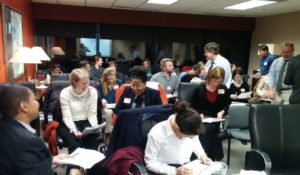
MA: What are the key skills you feel are most important for today’s green leaders and jobseekers? How will the GCM empower attendees and help them hone those skills?
BO: I agree with Ed Mellett (https://leadersinenergy.org/skills-you-need-to-succeed-in-green-energy-and-sustainability-jobs/) that Technical Knowledge, an Inquiring Mind, Ingenuity, Curiousity, and Motivation are key. We work on all these skills in GCM in a variety of ways.
Taking these skills together from a leadership perspective, what differentiates people at the mid- and senior levels of organizations are their abilities to be self-aware and move the team forward towards the goal post.
What is that organization there to do — what’s it’s mission? How can you as a leader contribute to that “win” with your team? Can you have “courageous conversations” without alienating team members? How do you deal with the team when you’re in the clutch and something needs to change, and quickly? How can the leader know and pragmatically avoid or manage her/his own personal foibles in the process and lead the team to success, which in turn can contribute to their own professional success?
The people who truly are set apart in their offer and positioning are people who are continually working on these skills and abilities. That applies to people just entering the green field or looking to move up or over in the field.
MA: How do you choose the different topics for each particular session?
BO: The topics we’re covering are designed to guide participants in further developing their Green Career Portfolio — what their offer is and how they position themselves. We also draw on the Green Career Map, that categorizes the many subfields within the Green Economy.
MA: Where can readers learn more, and what can members of the LE community look forward to in the coming months?
BO: GCM is limited to 8 seats, and the Early Bird rate of $197 closes on October 15. We also are offering a Student Rate of $177. More info is at www.waterfordinc.com/green-career-momentum.
We also are in the process of developing additional programs and offerings that will build on our Green Career Workshops 1.0 and 2.0, and our EQ for Green Leaders Workshop. Plus, LE is very excited to host 4Gen in December, which will honor Green Leaders throughout the generations.
Look for more news later this year from us that focuses on Green Leadership and Career Development.
Check out Miriam Aczel’s previous interview with Dr. Offenbacker on Emotional Intelligence here
Miriam Aczel is a President’s Scholar PhD Candidate at Imperial College London’s Centre for Environmental Policy. Her research is on international energy science and policy, with a focus on mitigation of environmental and health impacts of shale gas, greenhouse gas removal technologies, and citizen science and public participation mechanisms. She is also co-founder and co-director of the Amir D. Aczel Foundation for Research and Education in Science and Mathematics, a nonprofit supporting educational programs in Cambodia and beyond.
Miriam is Director of Communications and blog editor for Leaders in Energy.
Dr. Beth Offenbacker has taught dozens of industry professionals the leadership and management skills necessary for achieving successful outcomes. Her portfolio includes public, private, and nonprofit sector experience, including serving in senior leadership roles. Extensive experience designing and leading engagement processes for environmental projects (watersheds, stormwater, sewer, and circular economy). She is a Tree Steward with Tree Stewards of Arlington and Alexandria, where she currently serves as Interim President, and she is the Director of Training and Development for Leaders in Energy. Her doctorate is from Virginia Tech’s Center for Public Administration and Policy.


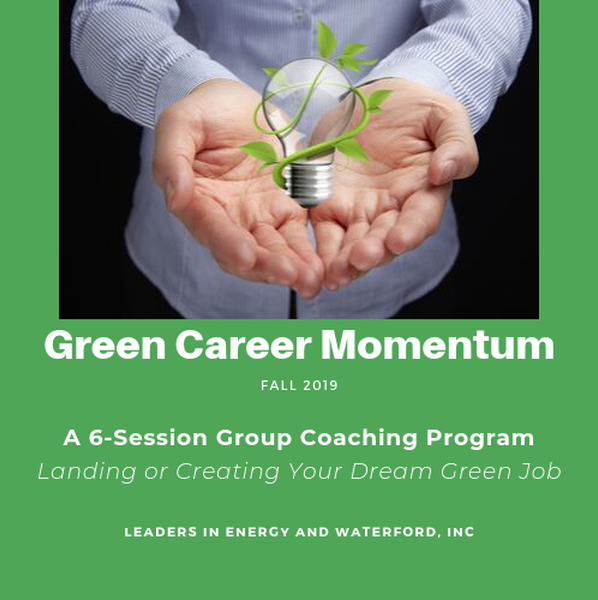
Leave a Reply